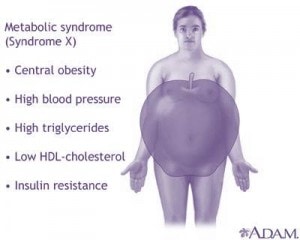Heavier Patients with Metabolic Syndrome Have Worse Hip and Knee Replacement Outcomes
Metabolic syndrome is a very important diagnosis that has only been uncovered in the last 5 years or so, despite a large proportion of Americans suffering from this problem. The syndrome starts with a diet too full of sugar carbohydrates (which includes bread, pasta, sweets, sweet drinks-including “natural” fruit juices), too little exercise, too little sleep, a likely a steady stream of hormonal exposure in processed and mass produced meats, and likely a steady stream of excessive and daily caffeine consumption. The problem is that not everybody exposed to these things gets the syndrome, so there are heavy genetic influences. This syndrome causes weight gain (in many patients, massive weight gain) and many of these patients have arthritis. It used to be thought that the arthritis was simply caused by excessive mechanical loading of the joints, but new research suggests that the syndrome itself causes too many bad chemicals to be produced in the joints and as a result, the joint cartilage matrix to breaks down. A new study which also links Metabolic syndrome to worse outcomes in knee and hip replacement surgery. Patients who had high blood pressure and obesity (two hallmarks of the metabolic syndrome) just didn’t function as well after the joint replacement surgery. This makes sense, as the cause of the joint pain is still present (the metabolic syndrome), so replacing a knee or hip in these patients still leaves a lot of knee or hip tissue to be impacted by the metabolic problems. This new study also fits with yet another recently published study that found that patients with this syndrome are also more likely to get an infection with a knee replacement surgery. For example, in this study of knee replacement complications, none of the patients without metabolic syndrome had an infection secondary to knee replacement, whereas about 3% of patients with the metabolic syndrome had a knee replacement related infection. The upshot? We often counsel our patients who are overweight to treat their metabolic syndrome aggressively before pursuing a stem cell treatment for arthritis. This research would also suggest that anyone considering a joint replacement should do the same.
If you have questions or comments about this blog post, please email us at [email protected]
NOTE: This blog post provides general information to help the reader better understand regenerative medicine, musculoskeletal health, and related subjects. All content provided in this blog, website, or any linked materials, including text, graphics, images, patient profiles, outcomes, and information, are not intended and should not be considered or used as a substitute for medical advice, diagnosis, or treatment. Please always consult with a professional and certified healthcare provider to discuss if a treatment is right for you.
